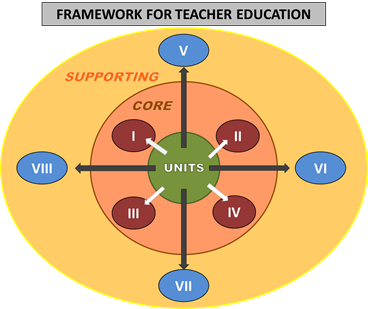To support teachers across Europe in adopting inquiry based approaches in their classroom practice, ESTABLISH has developed a structured programme for teacher education to introduce and develop certain teaching skills or “elements” useful for teaching by inquiry. This programme is based on a Framework for Teacher Education which draws on existing good practice in pre-service and in-service teacher education and outlines four core and four supporting teaching elements for the implementation of IBSE as depicted in Figure 1.

FIGURE 1 FRAMEWORK FOR ESTABLISH TEACHER EDUCATION PROGRAMMES.
The four core elements are:
- ESTABLISH view of IBSE – outlining the ESTABLISH view of inquiry, benefits to learning, role of inquiry in curriculum, providing direct experience of inquiry, considerations to ethical and gender issues;
- Industrial Content Knowledge (ICK) – industrial linking – highlighting the relevance and benefits of ICK to support IBSE; providing learning experiences and contexts informed by industry or real applications;
- Science Teacher as Implementer - Management– preparing teachers for facilitating and implementing inquiry teaching/learning in their own classroom through self-reflection to identify challenges and opportunities; to become effective in asking, owning, managing and encouraging questions that can be investigated; to develop and manage a student-centred classroom, to support student curiosity whilst carrying out different activities and also where the noise level may be higher than in a ‘traditional’ classroom as group discussions may be taking place. Also addressing time constraints within a predefined and packed curriculum.
- Science teacher as Developer - Feedback, Evaluation - assisting teachers to reflect on practice of inquiry within the classroom following implementation in classroom for evaluation of classroom experience; demonstrate how to turn traditional structured activities into inquiry-orientated activities; encourage, assist and enable teacher to develop inquiry lessons.
The four supporting elements are:
- ICT – develop confidence and competence in the effective use of ICT in teaching and learning of science and appropriate use in inquiry-based teaching/learning in inquiry.
- Argumentation in the classroom – address skills to develop and manage effective argumentation in the classroom.
- Research and design projects for students – providing authentic experiences – address the development of these ideas, what aspects provide authenticity, student ownership and endorsement and including evaluation of evidence to address the evidence from scientific experiments to determine the conclusions that can be made from the data, and how these can lead to further investigations.
VIII. Assessment of IBSE – address assessment of many aspects of inquiry; how assessments can be changed to provide value to the skills (cognitive, affective etc.) linked to IBSE.
An essential aspect of the ESTABLISH Teacher education Programme is the integral use of teaching and learning IBSE units that have been developed by ESTABLISH in collaboration with teachers and members of the scientific and industrial community. These 18 IBSE units contain 281 activities that serve as exemplary materials for science teachers and instructors of teacher professional development to experience the benefits of inquiry-based science education approach and are offered openly to inspire, guide and stimulate the further development of IBSE resources and practices.